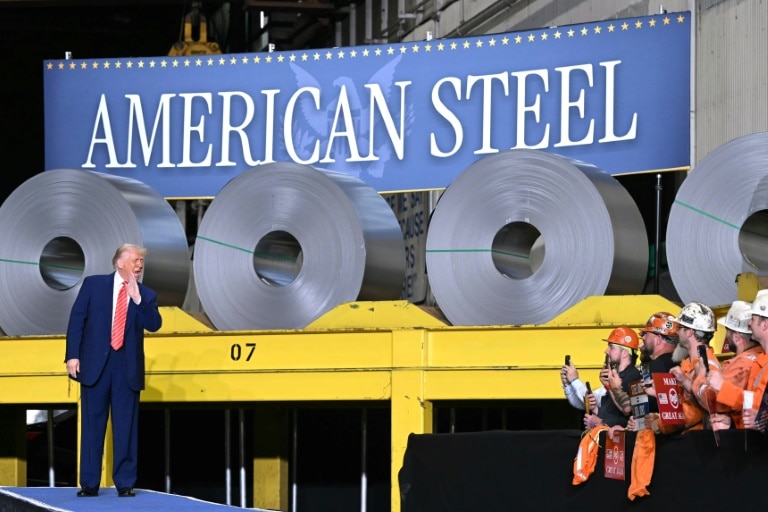UK to build attack subs as part of major defence review
UK to build attack subs as part of major defence review

Breaking News
Don't miss out on the headlines from Breaking News. Followed categories will be added to My News.
Britain announced Monday that it would build 12 new attack submarines as it launched a major defence review to move the country to "war-fighting readiness" in the face of "Russian aggression" and the changing nature of conflict.
Prime Minister Keir Starmer warned that "the threat we now face is more serious, more immediate and more unpredictable than at any time since the Cold War," as he launched the review in Glasgow.
"We face war in Europe, new nuclear risks, daily cyberattacks, growing Russian aggression in our waters, menacing our skies," he added.
The Strategic Defence Review, which assesses threats facing the UK and makes recommendations, said that Britain was entering "a new era of threat".
As a result, Starmer said his government aimed to deliver three "fundamental changes".
"First, we are moving to war-fighting readiness as the central purpose of our armed forces," he said.
"Every part of society, every citizen of this country, has a role to play, because we have to recognise that things have changed in the world of today. The front line, if you like, is here."
Secondly, the prime minister insisted that UK defence policy would "always be NATO first", and finally that the UK "will innovate and accelerate innovation at a wartime pace so we can meet the threats of today and of tomorrow."
- 'Blueprint for strength' -
Addressing parliament later Monday, Defence Secretary John Healey said the world had entered a "new era" and vowed to make the UK army "10 times more lethal" by combining future drone technology and artificial intelligence with the "heavy metal of tanks and artillery".
"We face war in Europe, growing Russian aggression, new nuclear risks and daily cyberattacks at home," he said.
"Our adversaries are working more in alliance with one another, while technology is changing the way war is fought -- we are in a new era of threat."
The UK has been racing to rearm in the face of the threat from Russia and fears that US President Donald Trump will no longer help protect Europe.
Starmer said the review would serve as "a blueprint for strength and security for decades to come", taking into account the increasing use of drones and artificial intelligence on the battlefield.
His government pledged in February to lift defence spending to 2.5 percent of GDP by 2027 in the "largest sustained increase in defence spending since the end of the Cold War".
And despite budget constraints, it aims for spending to rise to three percent in the next parliamentary term, due in 2029.
The Labour government has said it will cut UK overseas aid to help fund the spending.
Based on the recommendations of the review, which was led by former NATO secretary general George Robertson, the government said Sunday that it would boost stockpiles and weapons production capacity, which could be scaled up if needed.
This includes £1.5 billion ($2 billion) for building "at least six munitions and energetics factories", procuring 7,000 domestically built long-range weapons, and spending £6 billion on munitions over the current parliamentary term.
The government also said late Sunday that it would build up to 12 new attack submarines as part of its AUKUS military alliance with Australia and the United States.
Currently the UK is set to operate seven nuclear-powered Astute Class attack submarines, which will be replaced by the 12 AUKUS submarines from the late 2030s.
The defence ministry also said it would invest £15 billion in its nuclear warhead programme and last week pledged £1 billion for the creation of a "cyber command" to help on the battlefield.
- China 'challenge' -
The last such defence review was commissioned in 2021 by the previous Conservative government, and was revised in 2023 after Russia's invasion of Ukraine.
While launching the new review, Robertson said it would tackle threats from Russia, China, Iran and North Korea, calling them a "deadly quartet".
But in an op-ed article for The Sun newspaper, Starmer did not mention China, while warning that "The Kremlin is working hand in hand with its cronies in Iran and North Korea."
The softer rhetoric on China is in line with the Labour government's efforts to thaw relations with Beijing, which reached new lows under former prime minister Rishi Sunak's Conservative government.
The review describes Russia as an "immediate and pressing" threat, but calls China a "sophisticated and persistent challenge", according to The Guardian.
At a time when Washington is demanding that its NATO allies bolster their own defences, Britain is considering strengthening its deterrent by buying nuclear-missile capable aircraft from the United States, The Sunday Times reported.
aks-jwp-har/js
Originally published as UK to build attack subs as part of major defence review





